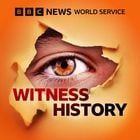On 27 January 1945, prisoners at the Nazis’ largest death camp were freed by the Soviet Union’s Red Army.
General Vasily Petrenko commanded one of the four units that liberated Auschwitz.
The Nazis murdered 1.1 million people at Auschwitz-Birkenau between 1941 and 1945. Almost a million were Jews, 70,000 were Polish prisoners, 21,000 Roma, 15,000 Soviet prisoners of war and an unknown number of gay men.
It was one of six death camps the Nazis built in occupied Poland in 1942, and it was by far the biggest.
Vicky Farncombe produced this episode using an interview General Vasily Petrenko gave to the BBC’s Russian Service in 2001. He died in 2003.
Eye-witness accounts brought to life by archive. Witness History is for those fascinated by the past. We take you to the events that have shaped our world through the eyes of the people who were there.
For nine minutes every day, we take you back in time and all over the world, to examine wars, coups, scientific discoveries, cultural moments and much more.
Recent episodes explore everything from the death of Adolf Hitler, the first spacewalk and the making of the movie Jaws, to celebrity tortoise Lonesome George, the Kobe earthquake and the invention of superglue.
We look at the lives of some of the most famous leaders, artists, scientists and personalities in history, including: Eva Peron – Argentina’s Evita; President Ronald Reagan and his famous ‘tear down this wall’ speech; Thomas Keneally on why he wrote Schindler’s List; and Jacques Derrida, France’s ‘rock star’ philosopher.
You can learn all about fascinating and surprising stories, such as the civil rights swimming protest; the disastrous D-Day rehearsal; and the death of one of the world’s oldest languages.
(Photo: Auschwitz survivors watch the arrival of Soviet troops come to free them. Credit: Keystone-France/Gamma-Keystone via Getty Images)


